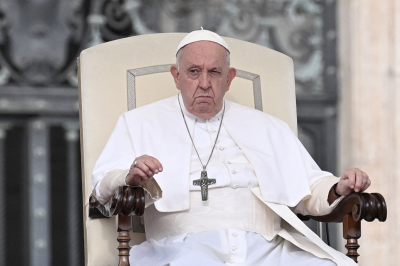David French, Pope Francis and universalism

David French is a former attorney and graduate of Harvard Law School who identifies as "an Evangelical Christian who believes in the inerrancy of Scripture." French became an Opinion columnist for The New York Times in 2023.
French writes, "I grew up uncomfortably fundamentalist, uneasy at my church's teaching but unsure of the alternative. I was especially plagued by questions about God's love for all humanity. The idea that our path was the only path did not strike me as obvious. This was especially true when I saw great cruelty in my own community and great virtue in many of the people I'd been taught were apostate."
French also offered this perspective: "Fundamentalists believe they know exactly how God wants you to vote, how to raise your kids, and even which movies and television programs He wants you to watch."
Like every believer, David French would greatly benefit from being actively involved in a congregation where God's grace is put into practice, rather than a religious setting where legalistic and judgmental people attempt to micromanage the lives of others. Beginning in 2004, David French and his family spent more than 15 years in the Presbyterian Church in America.
French penned an op-ed last week titled, "Pope Francis Is Turning Certainty on Its Head." I also addressed the pope's stunning comments in a CP op-ed titled, "Why Jesus Rejects the False Gospel Pope Francis Recently Proclaimed."
David French wrote, "I have a different perspective. Pope Francis wasn't watering down the Christian faith; he was expressing existential humility. He was unwilling to state, definitively, the mind of God and to pass judgment on the souls of others."
Do you see what French did there? First of all, he defended the pope's absurd claim that "all religions are a path to God." Secondly, he called the pope's misguided teaching a sign of humility. Thirdly, he equated humility with being unsure if we can trust what Jesus clearly and definitively said about Heaven and Hell. And fourthly, he implied that believers who affirm what Scripture says about Hell are actually "passing judgment on the souls of others."
In reality, there is nothing humble about presenting "a different Gospel," (Galatians 1:6) and nothing wrong with affirming Jesus' claim to be the only way to the Father (see John 14:6). Passing judgment occurs when you look down on someone, whereas proclaiming the truth about salvation with a compassionate heart is an act of love.
Interestingly, French is willing to endorse certain fundamentals of the Christian faith. For example, French noted that "Jews and Christians disagree about the divinity of Jesus." As a professing Christian, it would appear that French seems quite comfortable with the fundamental doctrine of Christ's divinity. French also references Christ's resurrection, implying that he believes it actually happened. You see, David French picks and chooses which fundamental doctrines make him feel comfortable, and which words from our Lord seem untenable and unrealistic to him.
French would be wise to reconsider the biblical meaning of the term "child of God." He wrote, "The idea that we are sons and daughters of God is basic Christian doctrine. He is the Creator, and we are His creation." But what does the Bible actually say about how someone becomes a child of God?
The Apostle Paul wrote, "You are all sons of God through faith in Christ Jesus" (Galatians 3:26). And the Apostle John wrote, "Yet to all who received Him, to those who believed in His name, He gave the right to become children of God — children born not of natural descent, nor of human decision or a husband's will, but born of God" (John 1:12-13).
Where did David French get the erroneous idea that people who are not born again spiritually through faith in Christ are nevertheless "children of God" in the biblical and eternal sense of the Word? He appears to have picked it up from a previous pope. French writes, "When I read John Paul II, I encountered a different idea … He argued something I'd never heard in my church — that Jesus saves even people who don't believe in him."
Sadly, it seems that Francis is not the first pope to flirt with Universalism. The seductive statement by John Paul II caught the attention of David French, who now unashamedly promotes this false doctrine on the pages of the New York Times.
It is one thing to be uncomfortable with judgmental people, legalism and racial prejudice. Every genuine follower of Christ should abhor such attitudes and behavior. But to take issue with Christ on the exclusive nature of what it means to be forgiven of your sins and eternally saved is another matter altogether.
The biblical teaching about Hell is in my view the second toughest doctrine in the Bible to wrap our mind around. So, what is the first? The fact that God sent His only Son to die for our sins by suffering torture on a cross for six hours, after already being viciously torn to shreds by flogging.
Jesus spoke much differently than Pope Francis's recent comments in Singapore, and much differently than Pope John Paul II who said that Jesus saves even people who don't believe in Him. If that was actually true, there would have been no reason for the Father to send His only Son to suffer the agony of death by crucifixion as payment for our sins. Jesus did not claim to be "one more way" of obtaining salvation; He claimed to be the only way. "No one comes to the Father except through me" (John 14:6).
The bottom line: "If righteousness could be gained through the Law, Christ died for nothing!" (Galatians 2:21). I am very thankful that "Christ died for all," (2 Cor. 5:15) and that "God wants everyone to be saved and to come to a knowledge of the truth" (1 Timothy 2:4).
Apart from the working of the Holy Spirit through Scripture, and especially the direct words of Jesus Christ in the four Gospels, we would be oblivious to the reality of eternal punishment in Hell and eternal bliss in Heaven.
Thankfully, God loved us enough to die for our sins on the cross, and to clearly reveal through His Word that believers go to Heaven, while unbelievers go to Hell.
The Apostle John summed up the clear teaching of Scripture: "Whoever believes in the Son has eternal life, but whoever rejects the Son will not see life, for God's wrath remains on him" (John 3:36).
(See Matthew 7:13,14; Matthew 13:41-43; 49-50; Matthew 25:31-46; Mark 9:43-49; John 3:36; John 5:25-29; Acts 4:12; 2 Peter 2:4-9; 2 Peter 3:9; Revelation 21:8 & Revelation 22:12-17.)
Dan Delzell is the pastor of Redeemer Lutheran Church in Papillion, Nebraska.




























